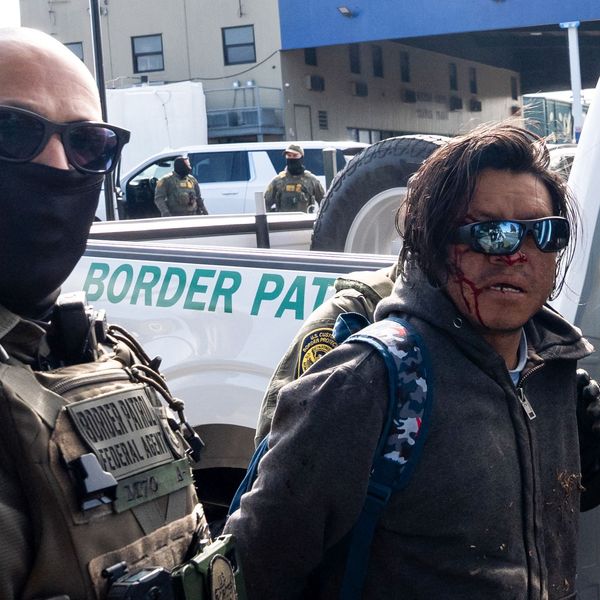
A United States Border Patrol agent on horseback tries to stop a Haitian migrant from entering an encampment on the banks of the Rio Grande near the Acuna Del Rio International Bridge in Del Rio, Texas on September 19, 2021.
To Defend Haitian Migrants, Oppose the US Policies That Forced Them to Flee
Truly addressing the root causes of migration will require the United States to seriously reevaluate its own centuries-long role in stifling Haitian democracy and creating a crisis of forced displacement.
The racist lies against Haitian immigrants in the United States that have been dominating the news cycle are being delivered by Republicans, but they are built on bipartisan—and often racist—U.S. policies that drive Haitians from their home country to our borders.
While we are justifiably condemning the hateful and dangerous attacks against Haitians, we need to equally condemn U.S. government support for repressive and corrupt Haitian leaders, and insist on supporting Haitians’ efforts to reestablish a stable, prosperous homeland where they can live in peace and security.
Haitian migrants seeking refuge in the United States and elsewhere are fleeing a deep crisis generated by actors associated with the U.S.-backed Pati Ayisyen Tèt Kale (PHTK). PHTK founder President Michel Martelly came to power in 2011, after the Obama administration pressured Haiti’s electoral council to change the results of the 2010 preliminary elections. U.S. support continued for Martelly’s hand-picked successor, President Jovenel Moïse, who came to power through flawed elections, overstayed his constitutionally mandated presidential term, and tried to push forward self-serving, illegal constitutional reform. The Biden administration installed and then continued to prop up Moïse’s successor, de facto Prime Minister Ariel Henry, who ruled for nearly three years without a constitutional or popular mandate. Martelly, Moïse, and Henry—all three of whom are affiliated with the PHTK—enjoyed consistent U.S. support despite being responsible for spectacular corruption, state-sanctioned massacres, and the dismantling of Haiti’s democratic structures and accountability mechanisms.
The Biden administration consistently preaches the importance of addressing root causes of migration, even as it continues to support corrupt and repressive Haitian actors that stifle democracy and drive Haitians to flee.
This persistent U.S. support has already undermined Haiti’s transition—which hopes to lead the country out of crisis and toward stability and democracy—by placing many of the same PHTK-affiliated actors responsible for Haiti’s crisis at its center. For example, through a process overseen by the State Department, PHTK-affiliated groups were granted 3 of the 7 voting seats on Haiti’s Transitional Presidential Council. Although an early attempt by those members to co-opt the transitional process ultimately failed, it left Haitians even more skeptical that the crisis could be resolved by the same U.S.-backed actors who created it.
The pattern of U.S. support for corrupt and repressive actors in Haiti follows a history of persistent destabilization ever since Haiti won its independence from France in 1804. The United States was afraid then that a stable and prosperous free Black republic would undermine the white supremacy upon which the U.S. system of enslavement—and attendant political and economic power—rested, and would inspire other Black people to fight for their freedom. Consequently, the U.S. government took steps early on to undermine Haiti’s development. These included refusing to recognize Haiti’s sovereignty until 1864 and occupying the country for nearly 20 years, from 1915 to 1934. During that time, marines stole gold from Haiti’s national reserves, took control of its financial and political institutions, and reinstated a system of forced labor akin to enslavement.
Significant Haitian migration to the United States began in the 1960s in response to the horrors inflicted by the U.S.-backed Duvalier dictatorships. For nearly 30 years, the United States supported Francois “Papa Doc” and Jean-Claude “Baby Doc” Duvalier despite their well-documented disregard for human rights and democracy, because they were a reliable vote against Cuba at the United Nations and the Organization of American States. The U.S. government labeled Haitians fleeing the brutality of the Duvaliers’ secret police “economic migrants” and detained and removed them, even as it welcomed those fleeing communist Cuba and Vietnam as “political refugees.”
Emigration from Haiti spiked when Haitians fled the brutal U.S.-backed military regime that took power after the 1991 coup d’état—also allegedly supported by the CIA—that overthrew Haiti’s first democratically-elected president, Jean-Bertrand Aristide. It spiked again in 2004 after a U.S.-backed coup ousted Aristide a second time. The U.S. government used the period of extreme violence that predictably followed the coup it had orchestrated to justify sending in a U.N. peacekeeping operation, MINUSTAH. The peacekeeping mission lasted 13 years, cost over $7 billion, and was responsible for countless violations of Haitian rights and dignity. Meanwhile, the United States installed a series of undemocratic U.S.-backed regimes, including the PHTK-affiliated regimes described above.
The Biden administration consistently preaches the importance of addressing root causes of migration, even as it continues to support corrupt and repressive Haitian actors that stifle democracy and drive Haitians to flee. A recent resolution put forth by members of the Congressional Progressive Caucus calling for legislation that directly addresses U.S. policies contributing to forced migration—including the failure to stop the flow of weapons trafficking from the United States to Haiti—is an important step toward aligning U.S. practices with its rhetoric.
But truly addressing the root causes of migration will require the United States to seriously reevaluate its own centuries-long role in the crisis of forced displacement in Haiti. As long as we keep supporting the corrupt, repressive actors whose policies force Haitians to flee, they are going to keep arriving at our borders.
An Urgent Message From Our Co-Founder
Dear Common Dreams reader, The U.S. is on a fast track to authoritarianism like nothing I've ever seen. Meanwhile, corporate news outlets are utterly capitulating to Trump, twisting their coverage to avoid drawing his ire while lining up to stuff cash in his pockets. That's why I believe that Common Dreams is doing the best and most consequential reporting that we've ever done. Our small but mighty team is a progressive reporting powerhouse, covering the news every day that the corporate media never will. Our mission has always been simple: To inform. To inspire. And to ignite change for the common good. Now here's the key piece that I want all our readers to understand: None of this would be possible without your financial support. That's not just some fundraising cliche. It's the absolute and literal truth. We don't accept corporate advertising and never will. We don't have a paywall because we don't think people should be blocked from critical news based on their ability to pay. Everything we do is funded by the donations of readers like you. Will you donate now to help power the nonprofit, independent reporting of Common Dreams? Thank you for being a vital member of our community. Together, we can keep independent journalism alive when it’s needed most. - Craig Brown, Co-founder |
The racist lies against Haitian immigrants in the United States that have been dominating the news cycle are being delivered by Republicans, but they are built on bipartisan—and often racist—U.S. policies that drive Haitians from their home country to our borders.
While we are justifiably condemning the hateful and dangerous attacks against Haitians, we need to equally condemn U.S. government support for repressive and corrupt Haitian leaders, and insist on supporting Haitians’ efforts to reestablish a stable, prosperous homeland where they can live in peace and security.
Haitian migrants seeking refuge in the United States and elsewhere are fleeing a deep crisis generated by actors associated with the U.S.-backed Pati Ayisyen Tèt Kale (PHTK). PHTK founder President Michel Martelly came to power in 2011, after the Obama administration pressured Haiti’s electoral council to change the results of the 2010 preliminary elections. U.S. support continued for Martelly’s hand-picked successor, President Jovenel Moïse, who came to power through flawed elections, overstayed his constitutionally mandated presidential term, and tried to push forward self-serving, illegal constitutional reform. The Biden administration installed and then continued to prop up Moïse’s successor, de facto Prime Minister Ariel Henry, who ruled for nearly three years without a constitutional or popular mandate. Martelly, Moïse, and Henry—all three of whom are affiliated with the PHTK—enjoyed consistent U.S. support despite being responsible for spectacular corruption, state-sanctioned massacres, and the dismantling of Haiti’s democratic structures and accountability mechanisms.
The Biden administration consistently preaches the importance of addressing root causes of migration, even as it continues to support corrupt and repressive Haitian actors that stifle democracy and drive Haitians to flee.
This persistent U.S. support has already undermined Haiti’s transition—which hopes to lead the country out of crisis and toward stability and democracy—by placing many of the same PHTK-affiliated actors responsible for Haiti’s crisis at its center. For example, through a process overseen by the State Department, PHTK-affiliated groups were granted 3 of the 7 voting seats on Haiti’s Transitional Presidential Council. Although an early attempt by those members to co-opt the transitional process ultimately failed, it left Haitians even more skeptical that the crisis could be resolved by the same U.S.-backed actors who created it.
The pattern of U.S. support for corrupt and repressive actors in Haiti follows a history of persistent destabilization ever since Haiti won its independence from France in 1804. The United States was afraid then that a stable and prosperous free Black republic would undermine the white supremacy upon which the U.S. system of enslavement—and attendant political and economic power—rested, and would inspire other Black people to fight for their freedom. Consequently, the U.S. government took steps early on to undermine Haiti’s development. These included refusing to recognize Haiti’s sovereignty until 1864 and occupying the country for nearly 20 years, from 1915 to 1934. During that time, marines stole gold from Haiti’s national reserves, took control of its financial and political institutions, and reinstated a system of forced labor akin to enslavement.
Significant Haitian migration to the United States began in the 1960s in response to the horrors inflicted by the U.S.-backed Duvalier dictatorships. For nearly 30 years, the United States supported Francois “Papa Doc” and Jean-Claude “Baby Doc” Duvalier despite their well-documented disregard for human rights and democracy, because they were a reliable vote against Cuba at the United Nations and the Organization of American States. The U.S. government labeled Haitians fleeing the brutality of the Duvaliers’ secret police “economic migrants” and detained and removed them, even as it welcomed those fleeing communist Cuba and Vietnam as “political refugees.”
Emigration from Haiti spiked when Haitians fled the brutal U.S.-backed military regime that took power after the 1991 coup d’état—also allegedly supported by the CIA—that overthrew Haiti’s first democratically-elected president, Jean-Bertrand Aristide. It spiked again in 2004 after a U.S.-backed coup ousted Aristide a second time. The U.S. government used the period of extreme violence that predictably followed the coup it had orchestrated to justify sending in a U.N. peacekeeping operation, MINUSTAH. The peacekeeping mission lasted 13 years, cost over $7 billion, and was responsible for countless violations of Haitian rights and dignity. Meanwhile, the United States installed a series of undemocratic U.S.-backed regimes, including the PHTK-affiliated regimes described above.
The Biden administration consistently preaches the importance of addressing root causes of migration, even as it continues to support corrupt and repressive Haitian actors that stifle democracy and drive Haitians to flee. A recent resolution put forth by members of the Congressional Progressive Caucus calling for legislation that directly addresses U.S. policies contributing to forced migration—including the failure to stop the flow of weapons trafficking from the United States to Haiti—is an important step toward aligning U.S. practices with its rhetoric.
But truly addressing the root causes of migration will require the United States to seriously reevaluate its own centuries-long role in the crisis of forced displacement in Haiti. As long as we keep supporting the corrupt, repressive actors whose policies force Haitians to flee, they are going to keep arriving at our borders.
- Abusing Migrants While on Horseback Fits With the Border Patrol's Long History of Brutality ›
- Biden Admin Takes 'Urgent and Necessary' Step to Protect 100,000+ Haitians From Deportation ›
- Over 400 Groups Urge Biden to Strengthen Protections for Haitian Migrants ›
- US Hegemony From Haiti to Honduras ›
- On Immigration, the Democrats Must Propose a True Alternative to Trumpism ›
- Death of 40 Haitians in Boat Fire Shows 'Crucial Need' for Safe, Legal Migration: UN ›
The racist lies against Haitian immigrants in the United States that have been dominating the news cycle are being delivered by Republicans, but they are built on bipartisan—and often racist—U.S. policies that drive Haitians from their home country to our borders.
While we are justifiably condemning the hateful and dangerous attacks against Haitians, we need to equally condemn U.S. government support for repressive and corrupt Haitian leaders, and insist on supporting Haitians’ efforts to reestablish a stable, prosperous homeland where they can live in peace and security.
Haitian migrants seeking refuge in the United States and elsewhere are fleeing a deep crisis generated by actors associated with the U.S.-backed Pati Ayisyen Tèt Kale (PHTK). PHTK founder President Michel Martelly came to power in 2011, after the Obama administration pressured Haiti’s electoral council to change the results of the 2010 preliminary elections. U.S. support continued for Martelly’s hand-picked successor, President Jovenel Moïse, who came to power through flawed elections, overstayed his constitutionally mandated presidential term, and tried to push forward self-serving, illegal constitutional reform. The Biden administration installed and then continued to prop up Moïse’s successor, de facto Prime Minister Ariel Henry, who ruled for nearly three years without a constitutional or popular mandate. Martelly, Moïse, and Henry—all three of whom are affiliated with the PHTK—enjoyed consistent U.S. support despite being responsible for spectacular corruption, state-sanctioned massacres, and the dismantling of Haiti’s democratic structures and accountability mechanisms.
The Biden administration consistently preaches the importance of addressing root causes of migration, even as it continues to support corrupt and repressive Haitian actors that stifle democracy and drive Haitians to flee.
This persistent U.S. support has already undermined Haiti’s transition—which hopes to lead the country out of crisis and toward stability and democracy—by placing many of the same PHTK-affiliated actors responsible for Haiti’s crisis at its center. For example, through a process overseen by the State Department, PHTK-affiliated groups were granted 3 of the 7 voting seats on Haiti’s Transitional Presidential Council. Although an early attempt by those members to co-opt the transitional process ultimately failed, it left Haitians even more skeptical that the crisis could be resolved by the same U.S.-backed actors who created it.
The pattern of U.S. support for corrupt and repressive actors in Haiti follows a history of persistent destabilization ever since Haiti won its independence from France in 1804. The United States was afraid then that a stable and prosperous free Black republic would undermine the white supremacy upon which the U.S. system of enslavement—and attendant political and economic power—rested, and would inspire other Black people to fight for their freedom. Consequently, the U.S. government took steps early on to undermine Haiti’s development. These included refusing to recognize Haiti’s sovereignty until 1864 and occupying the country for nearly 20 years, from 1915 to 1934. During that time, marines stole gold from Haiti’s national reserves, took control of its financial and political institutions, and reinstated a system of forced labor akin to enslavement.
Significant Haitian migration to the United States began in the 1960s in response to the horrors inflicted by the U.S.-backed Duvalier dictatorships. For nearly 30 years, the United States supported Francois “Papa Doc” and Jean-Claude “Baby Doc” Duvalier despite their well-documented disregard for human rights and democracy, because they were a reliable vote against Cuba at the United Nations and the Organization of American States. The U.S. government labeled Haitians fleeing the brutality of the Duvaliers’ secret police “economic migrants” and detained and removed them, even as it welcomed those fleeing communist Cuba and Vietnam as “political refugees.”
Emigration from Haiti spiked when Haitians fled the brutal U.S.-backed military regime that took power after the 1991 coup d’état—also allegedly supported by the CIA—that overthrew Haiti’s first democratically-elected president, Jean-Bertrand Aristide. It spiked again in 2004 after a U.S.-backed coup ousted Aristide a second time. The U.S. government used the period of extreme violence that predictably followed the coup it had orchestrated to justify sending in a U.N. peacekeeping operation, MINUSTAH. The peacekeeping mission lasted 13 years, cost over $7 billion, and was responsible for countless violations of Haitian rights and dignity. Meanwhile, the United States installed a series of undemocratic U.S.-backed regimes, including the PHTK-affiliated regimes described above.
The Biden administration consistently preaches the importance of addressing root causes of migration, even as it continues to support corrupt and repressive Haitian actors that stifle democracy and drive Haitians to flee. A recent resolution put forth by members of the Congressional Progressive Caucus calling for legislation that directly addresses U.S. policies contributing to forced migration—including the failure to stop the flow of weapons trafficking from the United States to Haiti—is an important step toward aligning U.S. practices with its rhetoric.
But truly addressing the root causes of migration will require the United States to seriously reevaluate its own centuries-long role in the crisis of forced displacement in Haiti. As long as we keep supporting the corrupt, repressive actors whose policies force Haitians to flee, they are going to keep arriving at our borders.
- Abusing Migrants While on Horseback Fits With the Border Patrol's Long History of Brutality ›
- Biden Admin Takes 'Urgent and Necessary' Step to Protect 100,000+ Haitians From Deportation ›
- Over 400 Groups Urge Biden to Strengthen Protections for Haitian Migrants ›
- US Hegemony From Haiti to Honduras ›
- On Immigration, the Democrats Must Propose a True Alternative to Trumpism ›
- Death of 40 Haitians in Boat Fire Shows 'Crucial Need' for Safe, Legal Migration: UN ›

